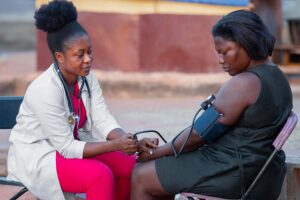When it comes to blood plasma donation, there are several myths circulating that prevent many people from considering this vital act of giving. In Nigeria, where the need for blood donation is high, it is crucial to separate fact from fiction. Understanding the blood donation process, the benefits, and the actual requirements can empower you to make an informed decision. Oneus is here to help debunk the common myths and guide you through the life-saving process of donating blood and plasma.
What Is Blood Plasma Donation and Why Is It Important?
Blood plasma donation involves giving the yellowish liquid portion of your blood. Plasma contains water, salts, enzymes, and proteins that help with clotting and immune responses. Unlike a regular blood donation, where red blood cells are collected, plasma donation takes a little longer. This is because plasma is separated from other blood components using a special machine in a plasma center.
In Nigeria, the demand for blood plasma is high. It’s essential for treating conditions like burns, cancer treatments, and helping patients with immune system disorders. Plasma can also be used for platelet donation or stem cell donation.
Myths About Blood Plasma Donation
1. Myth: Donating Blood Plasma is Dangerous and Painful
This is one of the most common misconceptions. The blood plasma donation process is generally safe and involves minimal discomfort. The rhesus factor and genotype of the donor are considered before the procedure to ensure compatibility. Most donors experience only slight discomfort when the needle is inserted. Modern plasma centers use sterile equipment and follow strict safety protocols to ensure the health of the donor.
2. Myth: You Can Sell Your Plasma for Huge Amounts of Money
While it’s true that there are places where people can sell plasma, it is not as profitable as many believe. Selling plasma is not the same as selling blood. The process is regulated, and the compensation is minimal, mostly to cover your time and the procedure. The ethical considerations of selling plasma should also be kept in mind. Donating plasma, however, is an entirely selfless act that saves lives and strengthens communities.
3. Myth: Plasma Donation is the Same as Blood Donation
Another myth is that plasma donation is the same as blood donation. While both processes involve giving your blood, the methods and purposes are different. Blood donation involves taking whole blood, while plasma donation isolates the plasma. Depending on your blood group and rhesus factor, your donation may be more valuable for one purpose over the other. Plasma donation requires a bit more time, as the red blood cells and platelets are returned to the donor’s body during the process.
4. Myth: Blood Plasma Donation is Not Crucial
Some people think plasma donation isn’t as important as donating whole blood. However, blood plasma is crucial for numerous medical treatments, such as treating burn victims, supporting patients with clotting disorders, and assisting in emergency trauma care. Without enough plasma donors, hospitals can face shortages that delay or even jeopardize life-saving treatments.
5. Myth: You Need to Be Healthy to Donate Blood Plasma
This is partially true but often misunderstood. You don’t need to be in perfect health to donate plasma, but there are certain guidelines. If you are suffering from a blood disease, or if you are currently on medication that affects blood clotting, you may be ineligible to donate. It’s always a good idea to consult with a doctor or a trained specialist at the plasma center before donating.
The Benefits of Blood Plasma Donation
The benefits of blood plasma donation extend beyond saving lives. It also offers health benefits to the donor:
-
Blood donation benefits to the skin: Regular donation can improve your overall health, helping your skin look fresher and more vibrant.
-
Reduced risk of heart disease: Some studies suggest that regular plasma donation can lower your risk of heart disease by reducing iron levels in the blood.
-
Improved mental health: The act of giving is known to improve mental health, as it provides a sense of satisfaction and purpose.
Why You Should Donate Plasma in Nigeria
In Nigeria, the need for blood donation is urgent. The blood bank system faces frequent shortages, particularly in rural areas. By donating, you are not only helping someone in need, but you are also supporting the health system and contributing to public health awareness.
Additionally, with the rise of umbilical cord blood banking and private cord blood banking, more Nigerians are aware of the importance of blood and plasma donation. By supporting organizations like Oneus, you help ensure that more lives can be saved.
Risks of Not Donating Blood
The consequences of not donating blood are far-reaching. Blood shortages can affect the treatment of cancer patients, those undergoing surgery, and victims of accidents. Without enough donors, many hospitals may be forced to delay treatments, which can worsen the prognosis of those in need.
How to Donate Blood Plasma and Make a Difference
If you’re interested in giving blood, consider visiting a nearby plasma center or blood donation website like Oneus for detailed information. Here’s a simple step-by-step guide:
-
Check Eligibility: Ensure that you meet the basic health criteria. You must be between 18-65 years, healthy, and weigh at least 50 kg.
-
Consult a Specialist: Speak with a healthcare professional about your blood group, rhesus factor, and genotype to ensure compatibility.
-
Find a Center: Locate a certified plasma donation center or blood drive near you.
-
Donate: Follow the steps provided at the center, and remember, your donation can help save lives.
Call to Action: Give Blood, Save a Life
Now that you know the facts, it’s time to take action. Give blood, donate plasma, and save lives. The need for blood and plasma in Nigeria is greater than ever. Don’t wait—your donation could make a world of difference.
Book your donation now! Contact us at info@oneusng.com or call +234 902 168 2822. Visit Oneus for more information and to schedule your life-saving appointment today!
By sharing knowledge about the importance of blood and plasma donation, we can create a culture of giving and support healthcare efforts across Nigeria. Together, we can save lives!




